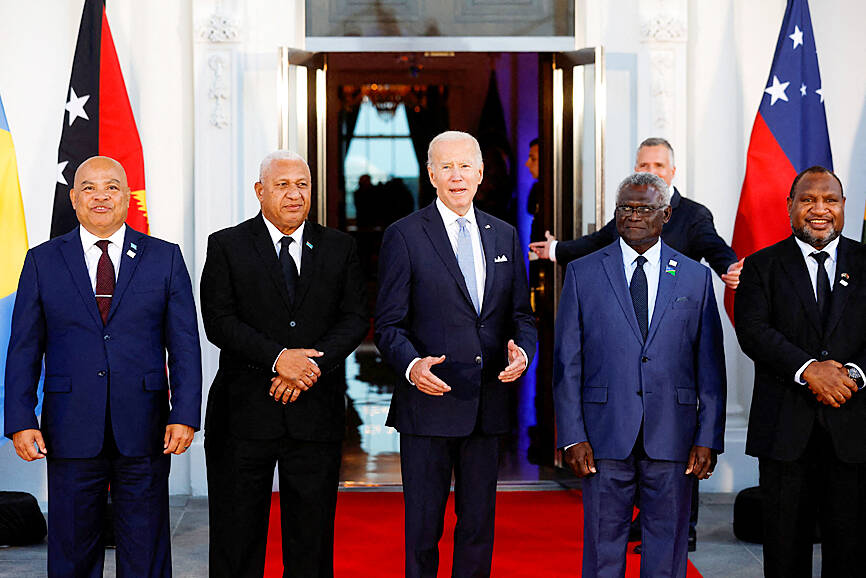US President Joe Biden is set to become the first sitting US president in at least a century to visit Papua New Guinea, Papua New Guinean Minister of Foreign Affairs Justin Tkatchenko said yesterday, revealing plans for a brief, but symbolic trip.
The region around the country could prove vital in any possible military conflagration over Taiwan.
Biden plans to stop at Port Moresby next months as he travels between a G7 summit in Japan and a Quadrilateral Security Dialogue summit in Sydney, Tkatchenko said.

Photo: Reuters
“He is coming on the 22nd, in the morning, and will be here for three hours only,” Tkatchenko said, adding that talks were expected to focus on the economy, security and climate change.
Biden’s trip might put the finishing touches on a US-Papua New Guinea Defense Cooperation Agreement that would allow more joint training and the development of security infrastructure.
The presidential trip is a nod toward the country’s rapidly growing strategic importance, as the US and its allies tussle with China for influence across the Asia-Pacific region.
Chinese President Xi Jinping (習近平) visited Port Moresby in 2018 to much fanfare, with Chinese flags hoisted across the capital and his motorcade whizzing past gathered crowds.
The trip was seen as a major diplomatic coup for Beijing. US and Australian officials have been concerned by a rapid uptick in Chinese investment in the resource-rich nation.
There have also been concerns that China has been trying to establish a military outpost, prompting Washington to move toward establishing a joint naval facility at Lombrum on Manus Island.
Construction started in mid-2020, according to the Australian Department of Defence, which is also taking part in the initiative.
Four Guardian-class patrol boats are expected to be based at the facility.
US Department of State records, which date back to then-US president Theodore Roosevelt’s administration in 1901, show that no sitting US president has visited Papua New Guinea.
However, the importance of the region has come more sharply into focus since China and the Solomon Islands agreed on a security pact last year.
The details of the agreement have not been made public — at Beijing’s request — but a draft seen by reporters has provisions that would allow China to deploy troops to the country.
Washington and other capitals have expressed concern that Beijing could also establish a military outpost.
Last month, a state-backed Chinese company won a contract to develop the international port in the capital Honiara, a major victory in Beijing’s quest to gain a strategic foothold in the South Pacific.

A Chinese aircraft carrier group entered Japan’s economic waters over the weekend, before exiting to conduct drills involving fighter jets, the Japanese Ministry of Defense said yesterday. The Liaoning aircraft carrier, two missile destroyers and one fast combat supply ship sailed about 300km southwest of Japan’s easternmost island of Minamitori on Saturday, a ministry statement said. It was the first time a Chinese aircraft carrier had entered that part of Japan’s exclusive economic zone (EEZ), a ministry spokesman said. “We think the Chinese military is trying to improve its operational capability and ability to conduct operations in distant areas,” the spokesman said. China’s growing

Taiwan yesterday denied Chinese allegations that its military was behind a cyberattack on a technology company in Guangzhou, after city authorities issued warrants for 20 suspects. The Guangzhou Municipal Public Security Bureau earlier yesterday issued warrants for 20 people it identified as members of the Information, Communications and Electronic Force Command (ICEFCOM). The bureau alleged they were behind a May 20 cyberattack targeting the backend system of a self-service facility at the company. “ICEFCOM, under Taiwan’s ruling Democratic Progressive Party, directed the illegal attack,” the warrant says. The bureau placed a bounty of 10,000 yuan (US$1,392) on each of the 20 people named in

Nine retired generals from Taiwan, Japan and the US have been invited to participate in a tabletop exercise hosted by the Taipei School of Economics and Political Science Foundation tomorrow and Wednesday that simulates a potential Chinese invasion of Taiwan in 2030, the foundation said yesterday. The five retired Taiwanese generals would include retired admiral Lee Hsi-min (李喜明), joined by retired US Navy admiral Michael Mullen and former chief of staff of the Japan Self-Defense Forces general Shigeru Iwasaki, it said. The simulation aims to offer strategic insights into regional security and peace in the Taiwan Strait, it added. Foundation chair Huang Huang-hsiung

PUBLIC WARNING: The two students had been tricked into going to Hong Kong for a ‘high-paying’ job, which sent them to a scam center in Cambodia Police warned the public not to trust job advertisements touting high pay abroad following the return of two college students over the weekend who had been trafficked and forced to work at a cyberscam center in Cambodia. The two victims, surnamed Lee (李), 18, and Lin (林), 19, were interviewed by police after landing in Taiwan on Saturday. Taichung’s Chingshui Police Precinct said in a statement yesterday that the two students are good friends, and Lin had suspended her studies after seeing the ad promising good pay to work in Hong Kong. Lee’s grandfather on Thursday reported to police that Lee had sent